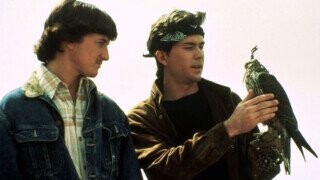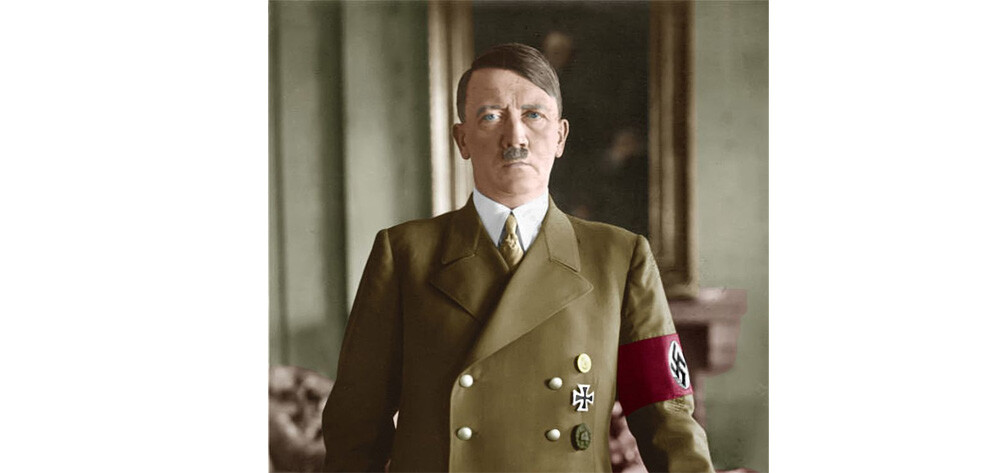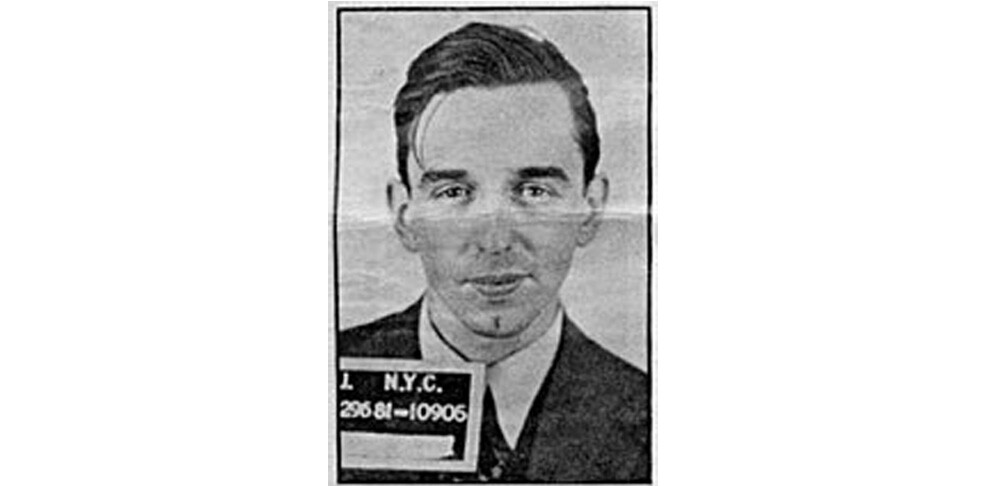5 Ridiculous Ways Real Spies Got Caught

At any given moment, several intelligence agents are currently hiding in your house, undetected. You don't notice them because they excel at stealth. Thankfully, however, not everyone's such a master of the trade, and so we managed to bring the following spies to justice, due to their bumbling incompetence.
The Nazi Spy's Bumpy Landing
During World War II, people in Britain were scared that secret Nazis were going to drop in by air, parachuting into quiet villages to wreak Nazi havoc. A generation who'd been terrorized by stories of Peter Pan and Mary Poppins swooping into bedrooms naturally looked to the skies in fear, and we've previously had some fun mocking how the Brits responded to this floating Nazi threat (they removed every signpost in the country

Josef Jakobs fought for Germany in World War I, then he became a dentist for a while, which certainly sounds evil. Then in 1938, he worked with a lawyer to forge passports for Jews fleeing Germany, which doesn't sound very evil at all. The Gestapo arrested him and put him in a concentration camp for a year, which really doesn't make him seem much like a guy on the side of the Nazis. But the authorities figured Jakobs' experience in the black market meant he had potential, so they released him from the camp and trained him as a spy.
On February 1, 1941, Jakobs parachuted into an English potato farm in the village of Ramsey, Huntingdonshire, a place we did not just make up. And so ended the brief spy career of Josef Jakobs.
He hurt his ankle jumping the wrong way out of his plane, you see. He landed poorly as a result, and then broke the already hobbled ankle. He fired his gun to summon help, and though he told famers that he had come from Amsterdam, they turned him over to the police. The radio equipment he carried betrayed his true mission. England put him on trial and sentenced him to die.

Hu Nhu/Wiki Commons
He was in fact the last person ever to be executed in the Tower of London. We guess the sentence made sense, since he was with the Nazis, and this was war after all. Still, we were under the impression that when you catch a spy, you usually return him to their country in exchange for one of your own spies that the other nation caught, or do something else equally neat and satisfying. Worse Nazis out there got punished less than this guy. Heck, this past year, we convicted one concentration camp guard for 5,000 murders, and we gave him just a suspended sentence.
The Guy Whose Wife Turned Him In (After 18 Years)
Our next spy also entered the biz because it was either that or prison. John Walker and a friend carried out some minor burglaries in 1955, stealing tires and car supplies mainly, and when the police caught up with them, they said Walker could go to jail or enlist in the navy. He chose to sail the seven seas. But he was unable to put his mind at ease, because while serving, he also opened a bar -- a bar that went belly-up, leaving him in debt.

Walker got a job in the communications office commanding the submarine force. In hindsight, the military realized it was a bad idea, leaving valuable intelligence in the hands of a youngster who'd previously stolen stuff and never got punished for it. Because in 1967, Walker figured out the solution to his money problems: He headed right to the Soviet Embassy and handed them some top secret documents. He worked out a deal to keep leaving goodies at prearranged locations, and he would go on working as a spy for the USSR for the next 18 years.
He'd make just a couple drop-offs a year, but it was enough to keep the bar running, buy a sports car, buy a boat, buy a damn airplane, and spend money in all all sorts of other ways that the KGB cautioned against in the name of discretion. The Navy never realized what he was doing, and we'd explain why that was, but that's classified. John's wife Barbara, on the other hand, did figure out something was up. She thought he might be having an affair (he was), so she searched through his things for phone numbers or secret photos. Instead, she found military documents, and when she confronted him about them, John said, "I'm a spy."

"Well, I am also sleeping with Janet, and I recruit for the KKK, but other than that, yeah, that's it."
At first, Barbara must have been into the idea, because she actually accompanied him on one of his drop-offs. But as so many male leads in prestige TV dramas know, these husband-wife alliances never last. He and Barbara eventually divorced. Still, she kept his secret, right up until she feared he might recruit their son as a spy next. So she phoned the FBI. Repeatedly. They didn't believe her, because she was generally drunk when she called.
Finally though, they did follow up on her tip, and they ended up nabbing John. They nabbed the couple's son Michael too -- she had waited too long, and John had recruited him -- but he went on to testify against his father. Once behind bars, John shared regrets over how he'd handled matters with his wife. "I should have assassinated her in the beginning," he said. "I should have put a f--king hole in her head."
Whoa there, John. No need to be so candid with us. Save something for the parole board! (John died in prison before he was eligible for parole.)
The Nazi Who Just Couldn't Stop Clubbing
And now for another American naval man who turned to the dark side. We're talking about William Colepaugh, who was born in Connecticut but ended up defecting to Germany during World War II. He wasn't doing it for the money. By all accounts, he just really loved Germany. He praised Germany while in college (and then promptly flunked out), he made German friends and called himself "Wilhelm," and in 1941, he even attended a birthday celebration for Hitler

He spent three months in the Navy before getting kicked out. We don't why they got rid of him, but we imagine the US Navy needed a good reason to discharge enlisted men while World War II was ongoing. William then joined a merchant ship and made it to Germany, where he presented himself as willing to serve the fatherland. Though he couldn't even speak German, the SS took him up his offer and enrolled him in a spy school they ran in the Netherlands.
Then came September 1944. Germany packed William and another agent, Erich Gimpel, on a boat and sent them to the US as saboteurs. The exact nature of this mission remains undisclosed, but objectives allegedly included studying Nazi propaganda in the wild and spying on rocket-testing labs. The Nazis had sent one previous mission two years earlier, but the spies all got caught. Maybe this odd couple, consisting of one experienced German officer and one American native, would do a better job.

Their German superiors provided the pair with $60,000 in cash (close to a million, in today's money), plus 99 diamonds, presumably in case that cash ran out, or the US suddenly adopted a new currency. You know how we said William wasn't in this for the money? We stand by that, but now that he actually found himself with more money than most people ever see, William went a little nuts.
He slipped away from his partner Gimpel so he could party. And then he just went on partying. He spent on food, and he spent on wine. He hooked up with a lounge singer, whose "ghastly" cocktail dress shocked Gimpel. Gimpel kept reminding William that he was supposed to buy radio parts, supposed to get back to the mission, but Will seemed to have rediscovered that America was pretty fun, so why had he ever been willing to help Germany again?

So William Colepaugh left Gimpel behind. He spent Christmas getting drunk with an old friend, and then he turned himself in to the FBI. He figured that if he explained the situation, everyone could have a good laugh and let him go, especially considering he was ratting on that spoilsport Gimpel. Things didn't quite go as he'd planned. The military convicted him of espionage and sentenced him to hang.
But then, just three days before his execution date. President Roosevelt died. FDR's successor, Harry S. Truman, decided to commute the sentence, and Colepaugh would eventually even be paroled. The war was done now, and Truman reasoned that if we just go executing people willy-nilly, we're no better than the enemy we fought and defeated.
The Spy Ring Brought Down By A 75-Cent Error
In August 1989, astronomer Clifford Stoll was working at the Lawrence Berkeley Laboratory in California. He was a systems administrator, and if you don't think that's the most exciting job in a building full of lasers and dark energy, well, let's try living one day without sys admins. When the Purge ensues, you'll regret your rash words.

Stoll was looking over the accounts when he noticed an unexplained 75-cent transaction. He spent three days investigating, and he discovered -- and we're now going to use the same words that newspapers in 1989 did -- someone "had gained access to the computer through telephone lines." They had a hacker on their hands, and when Stoll spent the next four months tracking the interloper's every move, things really got interesting.
The hacker's ultimate plan was not to rob the place using a series of 75-cent transactions, and nor was he interested in downloading lecture notes. The hacker was Markus Hess, a West German secretly working for the KGB, and he was using the lab as an entry point into 400 military computers. This meant creeping through the proto-internet as well as a separate military network that really should have been harder to slip into.

While showering with his girlfriend one day, Stoll came up with a plan to lay a trap for the hacker. The couple even named the plan Operation Showerhead, and while this might sound like too much information, Cliff really wanted people to know that he has sex. He planted some information on lab computers about a fictitious network that might interest the KGB, and the lab soon received inquiries about this network, from someone the FBI knew was a spy. Cliff also traced the hacker to Hanover, Germany, and the CIA followed up on his tip and discovered the guy on the other end, Hess, was indeed a spy as well.
West Germany arrested Hess, after some prodding. It all happened because of 75 cents ... and if that error had been more than that, Stroll said he'd never have followed up on it. “It's like, if your house collapses, you just assume there's been an earthquake,” he explained. "But if you find a tiny termite hole, you think, ‘Geez, I'd better investigate.'" Uh, we don't know about that, but we're not the counterintelligence scientist who has eureka moments during shower sex, so we'll just take his word for it.
The Falcon And His Falcons
Every spy needs a cool nickname, and for Christopher Boyce, it was "The Falcon." The KGB chose it for him not because his keen eyes let him see far or because he struck his targets like a bird of prey. They picked it because Boyce liked falcons -- actual falcons, through the sport of falconry. They nicknamed his partner Andrew Lee "The Snowman" because Lee liked cocaine -- actual cocaine, through the sport of cocaine. This pair and their codenames became common knowledge thanks to the bestselling book The Falcon and the Snowman, and the film of the same name starring Sean Penn.

Orion Pictures
In 1974, Boyce worked for an aerospace company with top-secret clearance, and through a series of wacky 1970s misunderstandings, the firm began receiving CIA cables they were never supposed to see. Boyce ended up shuttling these to the Soviets, and the way he describes it, he read stuff so terrible, he figured it was time to switch allegiances. That terrible stuff included the CIA plotting regime change ... in Australia. The CIA ended up going through with this plan.
Boyce and Lee spent the next three years traveling to Mexico City and dropping documents at the Soviet embassy there. Then in 1977, Lee made the bad choice of dropping some microfilm off while a policeman was watching him. That officer arrested him ... for littering. Under interrogation, Lee revealed that he and Boyce had actually been engaged in the slightly more serious crime of treason, and he wound up sentenced to jail for life.

Orion Pictures
Boyce was sentenced to jail too (for 40 years -- same espionage charge, but with less cocaine). And while that's where the book and movie ended, that wasn't the end of his story. In January 1980, he escaped prison, using a makeshift ladder to get over the fence. His prison was 100 miles outside of Los Angeles, so maybe he was going to flee to Mexico. But investigators looked for clues in the man's profile, which said he ate lots of vitamins, liked jogging, and of course was obsessed with falcons.
He was obsessed with one subspecies of peregrine falcons, specifically. So they narrowed their search to the areas this rare bird calls home, which meant the Olympic peninsula in Washington state. And by following up leads there, they managed to get their hands back on Boyce. Even as he became a fugitive, living in the wilderness with a mule, he hadn't been able to give up his love of falcons.

Orion Pictures
Boyce had been five days away from getting a pilot's license, which he said he would have used to flee the area for somewhere far away. So, they caught up with him just in time. Though, he'd certainly made the job of finding him easier by robbing 16 banks and getting caught on the security camera.
Follow Ryan Menezes on Twitter for more stuff no one should see.